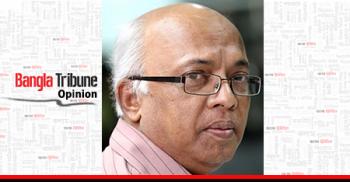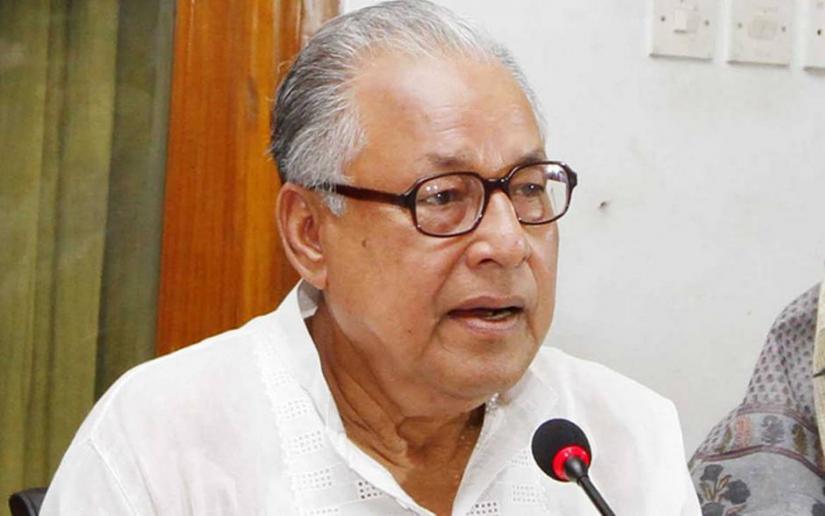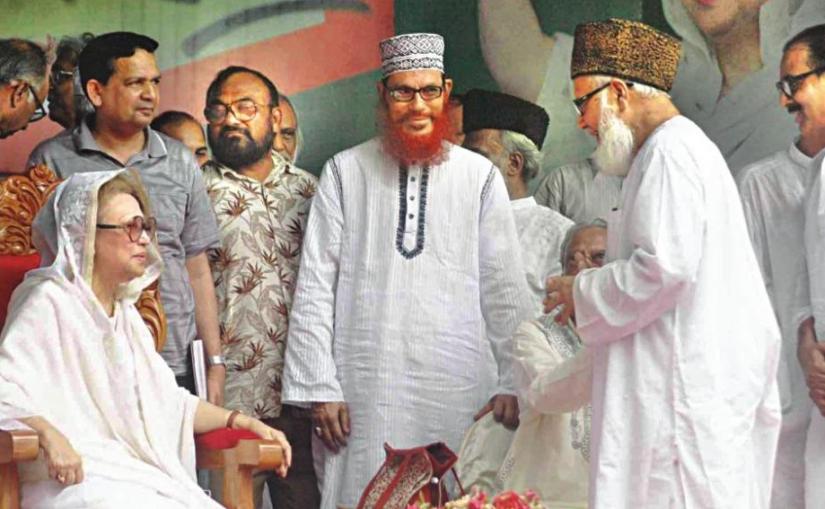 We have been informed, on the authority of Nazrul Islam Khan of the Bangladesh Nationalist Party (BNP) that contrary to our collective national belief the Jamaat-e-Islami has freedom fighters, muktijoddhas, in its ranks. That is indeed a revelation. We did not know, back in 1971, when the Jamaat and its youth and student wings were picking up and picking off their fellow Bengalis in the interest of preserving Pakistan’s solidarity and integrity that it had its own trove of freedom fighters. Should we thank Nazrul Islam Khan for pointing out to us our erroneous ideas about the War of Liberation?
We have been informed, on the authority of Nazrul Islam Khan of the Bangladesh Nationalist Party (BNP) that contrary to our collective national belief the Jamaat-e-Islami has freedom fighters, muktijoddhas, in its ranks. That is indeed a revelation. We did not know, back in 1971, when the Jamaat and its youth and student wings were picking up and picking off their fellow Bengalis in the interest of preserving Pakistan’s solidarity and integrity that it had its own trove of freedom fighters. Should we thank Nazrul Islam Khan for pointing out to us our erroneous ideas about the War of Liberation?
Let that question be suspended in the air. But let us remember that there has always been something infuriatingly intriguing about the Jamaat. During the War of Liberation, Ghulam Azam waxed eloquent about Pakistan, naturally. Pakistan, he said, was the house of Allah. And in the name of Allah the adherents of Abul A’ala Maududi went around kidnapping, raping and killing in occupied Bangladesh, all in the holy task of defending Pakistan. But, of course, we did not know — as Nazrul Islam Khan would have us know now — that there were indeed freedom fighters among the Jamaatis. How could we have been so naïve, so ignorant?
In the days following the end of the BNP-Jamaat coalition in Bangladesh, and that was when the Fakhruddin caretaker government was in office, Ali Ahsan Mujaheed cheerfully and brazenly told the media that there were no anti-liberation elements or collaborators in Bangladesh. He had a point. Under the Zia-Ershad-Khaleda dispensations, every distinction between patriots and quislings was sought to be blurred. Bangladesh’s people sang the national anthem, weeping copiously as Nizami and Mujaheed raced around happily in limousines topped by Bangladesh’s flag. That was an irony, but of course, the Jamaat did not see it that way. Neither did its friends in the BNP. All of them thought Bangladesh had turned, through their mighty efforts, into a new land of the pure.
 But, seriously, this matter of Jamaati freedom fighters poses a rather difficult question for us. It is not merely the role of the party in 1971 that is of concern. Once Bangladesh emerged triumphant and free as a nation, Ghulam Azam and the likes of him did not waste much time in shaping strategy to undermine the new state. Trapped in Pakistan in the final days of the war, Ghulam Azam nevertheless soon saw a commonality of purpose with Zulfikar Ali Bhutto. Pakistan’s new leader with alacrity sent him off to the Middle East to spread the untruth that in secular Bangladesh Muslims were being cut down by the government of Bangabandhu Sheikh Mujibur Rahman. The medieval royals of Saudi Arabia and the Gaddafi regime, along with a few other friends of Pakistan, bought the falsehood. The rest of the world ignored all Bengali agents of Pakistan sent abroad to lie for the broken country.
But, seriously, this matter of Jamaati freedom fighters poses a rather difficult question for us. It is not merely the role of the party in 1971 that is of concern. Once Bangladesh emerged triumphant and free as a nation, Ghulam Azam and the likes of him did not waste much time in shaping strategy to undermine the new state. Trapped in Pakistan in the final days of the war, Ghulam Azam nevertheless soon saw a commonality of purpose with Zulfikar Ali Bhutto. Pakistan’s new leader with alacrity sent him off to the Middle East to spread the untruth that in secular Bangladesh Muslims were being cut down by the government of Bangabandhu Sheikh Mujibur Rahman. The medieval royals of Saudi Arabia and the Gaddafi regime, along with a few other friends of Pakistan, bought the falsehood. The rest of the world ignored all Bengali agents of Pakistan sent abroad to lie for the broken country.
The Jamaat has consistently run counter to the tide of history and then attempted to abuse history before giving it a spin of its own. As the movement for Pakistan gathered steam in the 1940s, Maududi made it known that the Jamaat would have no truck with Muhammad Ali Jinnah and the All-India Muslim League. It was his indignant opinion that Jinnah was not the Quaid-e-Azam his followers made him out to be, but Kafir-e-Azam since in his view Pakistan would be nothing more than a land of non-believers. Maududi would soon eat his words and not only acknowledge the inevitability of Pakistan but also turn into one of its ardent defenders. The Jamaat’s goal was patent: Pakistan would in time become the theocratic state Maududi envisioned it to be.
 A small yet devastating step toward achieving that goal nearly came in 1953 when Maududi’s followers went on a rampage against the Ahmadiyya community in Lahore. It was an early hint of the fanatical ferocity the Jamaat-e-Islami would acquire and practise years down the road. Ahmadiyyas were hunted down and murdered, in the name of Islam, and blood flowed freely on the streets of Lahore. Not until General Azam Khan stepped in to whip Maududi’s followers into silence and submission would the mayhem draw to an end. Maududi was tried, sentenced to death and then pardoned. He and his followers would go on to push the state of Pakistan into newer dangers. If in 1953 the Jamaat killed Ahmadiyyas, in 1971 it bayed for Bengali blood. The war for Bangladesh remains the record of the asinine brutality the Jamaat exercised in close association with the Yahya Khan junta. In the final three days of Pakistan in these parts, the al-Badr goon squads of the Jamaat enthusiastically abducted prominent, nationalistic Bengalis before fiendishly thrusting the bayonets into them.
A small yet devastating step toward achieving that goal nearly came in 1953 when Maududi’s followers went on a rampage against the Ahmadiyya community in Lahore. It was an early hint of the fanatical ferocity the Jamaat-e-Islami would acquire and practise years down the road. Ahmadiyyas were hunted down and murdered, in the name of Islam, and blood flowed freely on the streets of Lahore. Not until General Azam Khan stepped in to whip Maududi’s followers into silence and submission would the mayhem draw to an end. Maududi was tried, sentenced to death and then pardoned. He and his followers would go on to push the state of Pakistan into newer dangers. If in 1953 the Jamaat killed Ahmadiyyas, in 1971 it bayed for Bengali blood. The war for Bangladesh remains the record of the asinine brutality the Jamaat exercised in close association with the Yahya Khan junta. In the final three days of Pakistan in these parts, the al-Badr goon squads of the Jamaat enthusiastically abducted prominent, nationalistic Bengalis before fiendishly thrusting the bayonets into them.
But, ah! We forget. There were and are, as the BNP’s Nazrul Islam Khan knows and would have us know, freedom fighters in the Jamaat-e-Islami. We would be a little more enlightened if Nazrul Islam Khan could parse the statement of the Jamaat newspaper Sangram in 1971: ‘There is nothing called Bangladesh anywhere’. That is not the language of a muktijoddha (freedom fighter). Or will Khan disagree?
Ghulam Azam made his fellow collaborators happy in the year of Yahya Khan and Tikka Khan when he vowed to place Tajuddin Ahmad on trial. The Sangram suggested in an editorial that the entire Awami League leadership be hauled before a tribunal for the ‘treason’ they had committed. At another point, it noted that through the Mukti Bahini the Awami League was conspiring to establish a Hindu state in the guise of Bangladesh.
Freedom fighters in the Jamaat-e-Islami, did you say? That would be stretching the lie a little too thin, even by the standards set by quislings anywhere.
Syed Badrul Ahsan is Editor-in-Charge, The Asian Age


